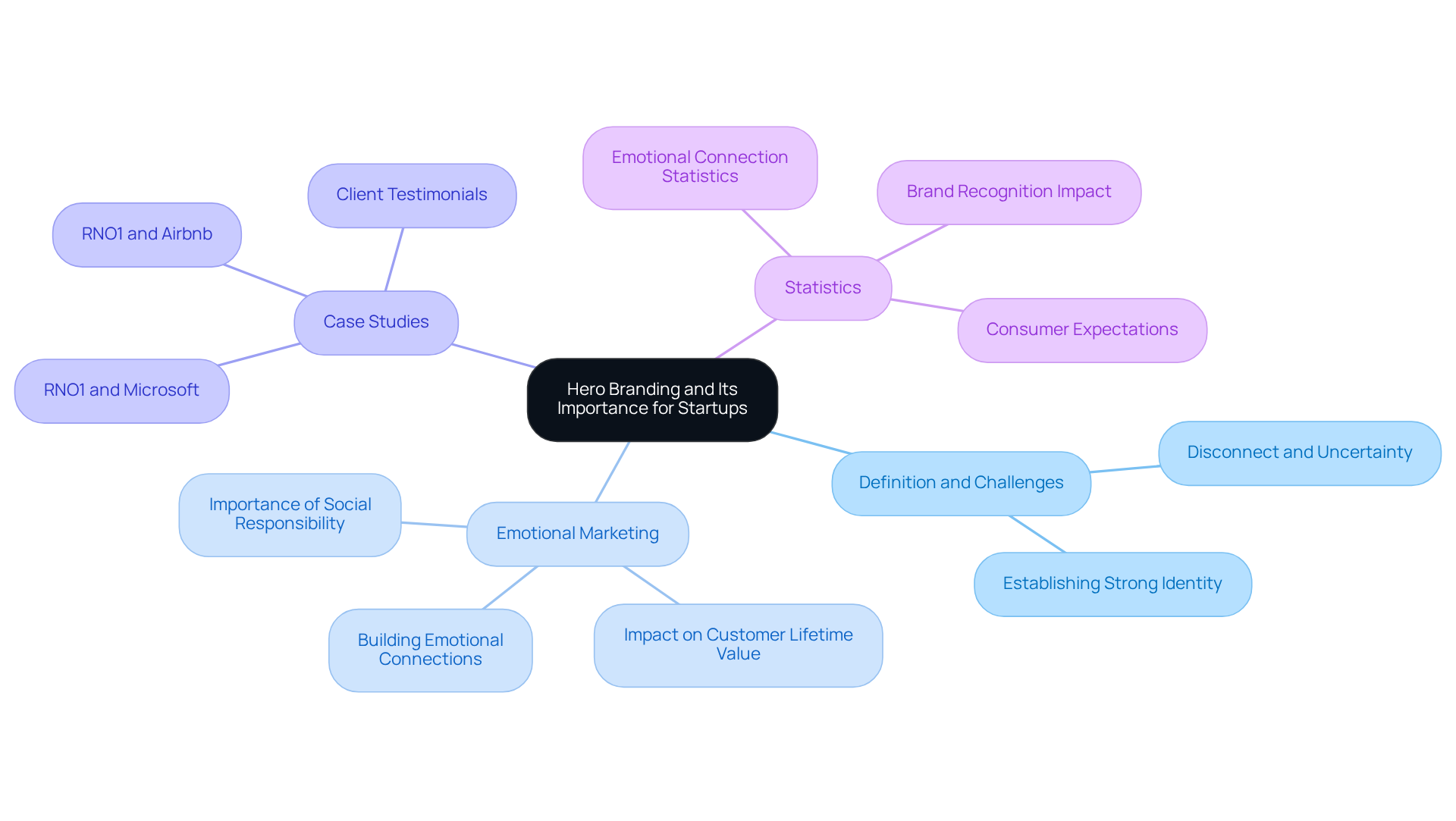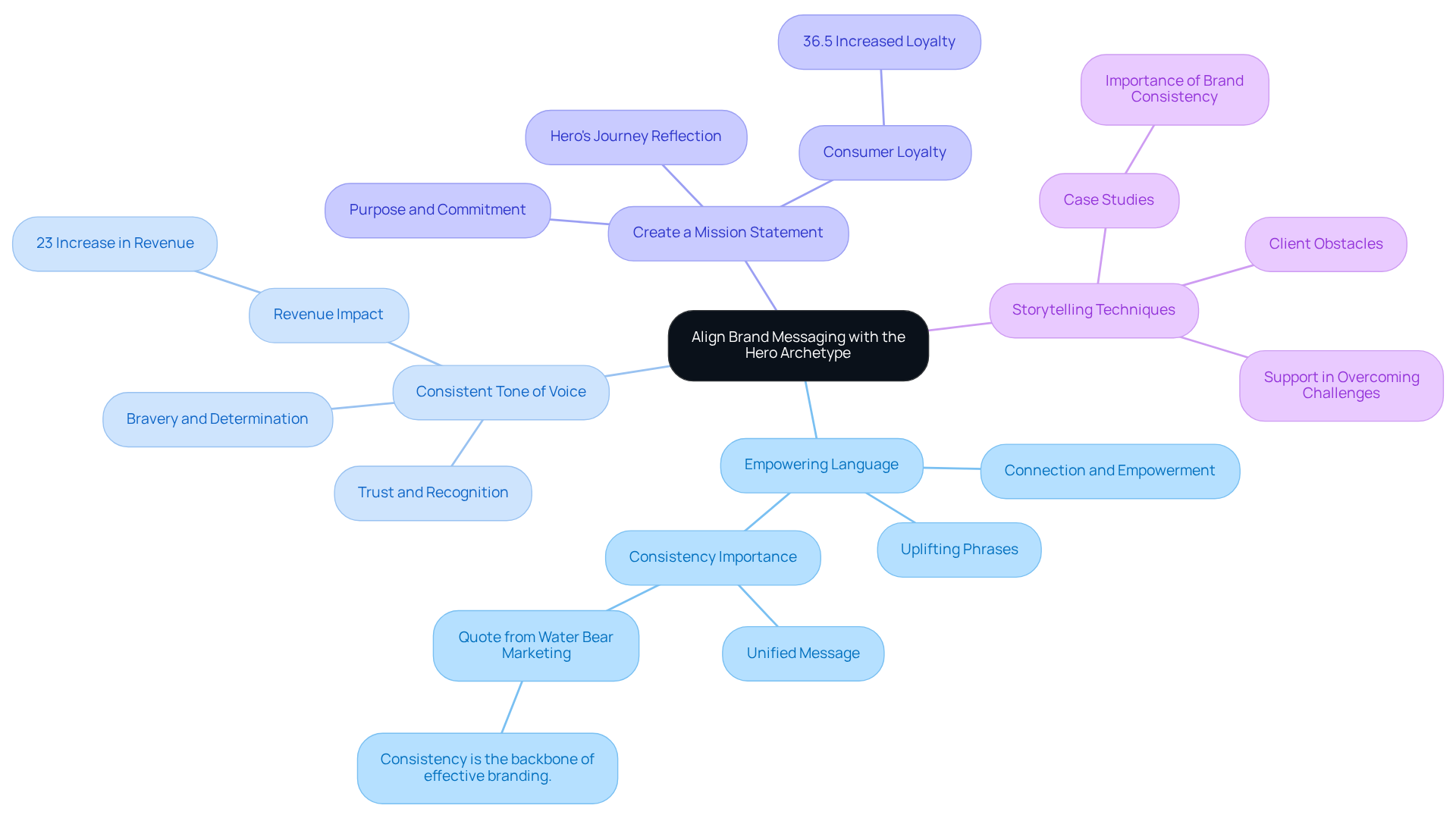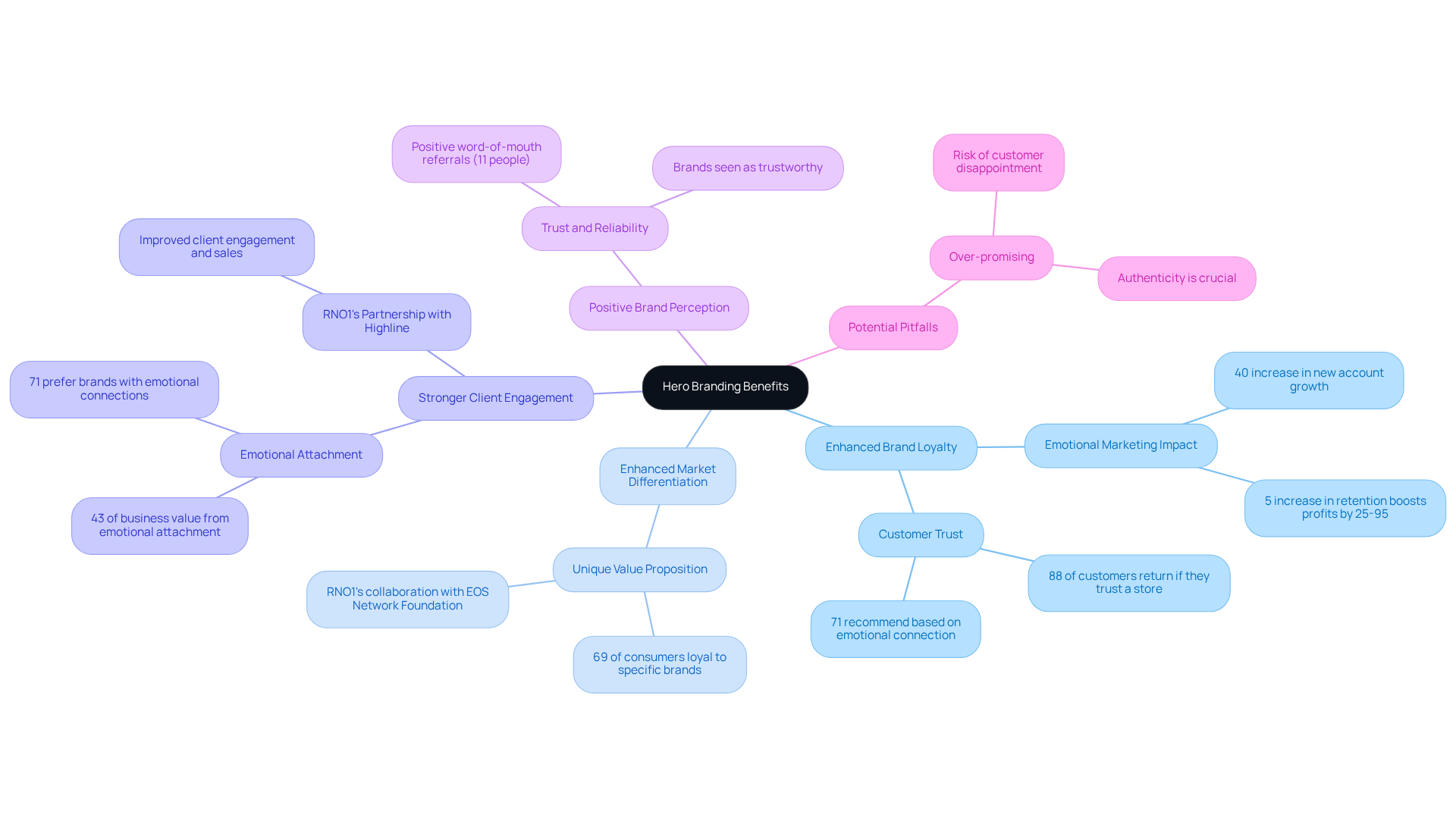Overview
Hero branding poses a significant challenge for startups. Many founders struggle to carve out a distinct identity in a crowded marketplace, often feeling disconnected from their audience. This disconnection can lead to a lack of brand loyalty and missed opportunities for growth. However, by embracing hero branding, startups can foster a strong emotional connection with their audience, positioning themselves as champions who resonate with shared values and aspirations.
Consider the power of storytelling. Engaging narratives not only capture attention but also create a sense of belonging among customers. When startups share their journey, they invite their audience to join them, fostering community involvement that enhances brand loyalty. This connection is vital, as it not only differentiates the brand in the market but also drives significant growth and customer retention.
As we reflect on these strategies, it’s clear that nurturing relationships with customers is essential. Startups can thrive by focusing on the emotional needs of their audience, creating a supportive environment where shared values flourish. By implementing these approaches, founders can transform their brands into relatable heroes in their industry, leading to lasting success and a loyal customer base.
Introduction
In the bustling world of tech startups, establishing a compelling identity can often feel like an uphill battle. Many founders find themselves grappling with the challenge of effectively communicating their mission, which can lead to feelings of frustration and isolation. This struggle is not just about standing out; it’s about connecting deeply with an audience that shares their vision.
The concept of hero branding emerges as a transformative solution, offering a pathway for startups to forge those emotional connections. By positioning themselves as champions of shared values and aspirations, they can resonate with their audience on a more profound level.
Yet, how can startups navigate the complexities of hero branding? It’s not just about differentiation in a crowded marketplace; it’s about fostering genuine loyalty and engagement among consumers. This is where the nurturing support of RNO1 comes into play, guiding founders through the intricacies of building a brand that truly reflects their mission and values.
Define Hero Branding and Its Importance for Startups
In the competitive landscape of tech startups, many founders face the daunting challenge of establishing a with their audience. This struggle can often leave them feeling disconnected and uncertain about how to convey their mission effectively. The pain of being overlooked or misunderstood can weigh heavily on their aspirations. However, there is a nurturing approach that can transform this situation: . By positioning their company as a champion or savior in the eyes of consumers, startups can forge deep emotional connections that reflect shared values and aspirations.
Take RNO1, for example. They have partnered with innovative firms like Microsoft and Airbnb, enhancing their identity and . These collaborations illustrate a commitment to advancing digital identity innovation and show how can lead to significant market disruption and growth. When startups embrace this champion archetype, they not only convey their mission to improve lives but also invite consumers to join them on this journey.
Emotional marketing plays a vital role in this narrative. Companies that create strong emotional bonds with their audience can see a remarkable —up to threefold! Moreover, consistent marketing efforts can boost income by 10-20%. This tangible financial motivation is essential for startups eager to embrace leading strategies. Yet, it’s crucial for these companies to align their values with the expectations of their consumers; after all, a staggering 76% of consumers will cease purchasing from brands that lack .
with clients like Interos and Flowhaven further demonstrate the effectiveness of hero branding. Brands that adopt these prominent strategies often experience heightened consumer engagement and loyalty. This not only emphasizes the significance of in the startup ecosystem but also highlights the importance of creating a supportive community. Together, we can navigate these challenges, fostering connections that uplift both businesses and the consumers they serve.

Implement Effective Strategies for Hero Branding
Startups face the challenge of standing out in a crowded marketplace to implement . This can feel overwhelming, as they strive to connect with their audience on a deeper level. However, there are nurturing strategies that can guide them towards success.
- Create an Engaging Brand Narrative: Startups can craft a compelling story that positions their clients as the heroes of the journey. By illustrating how their products or services help customers overcome obstacles, they are effectively practicing . For instance, showcases how their design expertise played a pivotal role in the platform’s acquisition by Airbnb, enabling users to navigate the rental market with greater ease and confidence.
- Utilize Visual Storytelling: The visuals a startup employs—like logos and marketing materials—should resonate with the protagonist archetype. Colors such as red and gold symbolize courage and triumph, while imagery can evoke feelings of strength and resilience. demonstrate how can significantly shift market perceptions, inviting customers to see themselves as part of a larger narrative.
- Engage with the Community: elevates its significance and fosters connection. Startups are encouraged to actively engage with their audience through social media, events, and partnerships, nurturing a sense of belonging and shared purpose. RNO1’s collaboration with Spring Labs highlights the importance of that resonate across multiple user touchpoints, thereby strengthening community bonds.
and case studies that reflect client achievements reinforces the hero branding narrative. For example, to launch digital branded experiences, not only enhance credibility but also inspire potential customers to envision their own success with the company. By celebrating these stories, startups can cultivate an environment of encouragement and hope, inviting others to join in their journey.
Align Brand Messaging with the Hero Archetype
To effectively align brand messaging with , startups often face challenges that can feel overwhelming. It’s essential to address these hurdles with strategies that not only inspire but also empower. Here are some nurturing approaches to consider:
- : Embrace language that uplifts and motivates. Phrases that highlight triumph over obstacles and the pursuit of greatness resonate deeply with your audience's aspirations. This fosters a sense of connection and empowerment. As Water Bear Marketing wisely states, "Consistency is the backbone of effective branding," reminding us of the that speaks to the heart.
- : It’s vital to maintain a tone that embodies bravery and determination across all communication channels. This consistency not only solidifies your identity as a hero but also enhances hero branding by building trust and recognition among consumers, who appreciate reliability in messaging. Research shows that can increase revenues by up to 23%, underscoring the that resonates with your audience.
- : Formulate a clear mission statement that captures your organization’s purpose and commitment to making a positive impact. This statement should reflect the hero's journey, showcasing your role in empowering individuals and fostering meaningful change. A well-defined mission can enhance consumer loyalty; in fact, 36.5% of U.S. shoppers express increased loyalty towards companies they frequently purchase from.
- : Engage your audience with storytelling methods that illuminate the obstacles faced by clients and illustrate how your company supports them in overcoming these challenges. This narrative approach can be seamlessly woven into your marketing campaigns, social media content, and website narratives, . Consider case studies, like 'The Importance of Brand Consistency,' which demonstrate how maintaining a uniform presence boosts consumer recognition and loyalty, offering a practical framework for startups to emulate.
By employing these strategies, you can create a that not only aligns with hero branding but also resonates with your audience on a deeper level. Remember, your journey is about empowering others, and every step you take towards a cohesive message is a step towards building a supportive community.

Explore the Benefits of Hero Branding for Growth
Hero branding offers numerous advantages that can significantly support a startup's growth:
- Enhanced Brand Loyalty: By positioning themselves as champions, companies cultivate stronger emotional bonds with their clients, fostering greater loyalty and encouraging repeat transactions. , highlighting the importance of these connections. Moreover, , underscoring the financial benefits of nurturing loyalty. exemplifies this, empowering modern founders to connect with their audience on a deeper level.
- Enhanced Market Differentiation: In a crowded marketplace, by effectively communicating their unique value proposition and mission. This differentiation is vital, as 69% of consumers expressed loyalty to specific brands in 2024, emphasizing the need for a distinct identity. , illustrate how redefining digital identities can create a unique market presence.
- Stronger Client Engagement: Engaging storytelling and community involvement foster . Brands that resonate with consumer values can anticipate enhanced interaction, as . Furthermore, emotional attachment contributes to approximately 43% of business value, demonstrating the significant impact of these relationships on overall success. resulted in tailored digital experiences that greatly improved client engagement and sales, showcasing the tangible benefits of a prominent brand.
- Positive Brand Perception: Brands that implement hero branding are often seen as trustworthy and reliable, enhancing their reputation and attracting new clients. This positive perception can lead to increased word-of-mouth referrals, with satisfied customers sharing their experiences with an average of 11 people. Consequently, startups can experience organic growth fueled by strong customer loyalty. have transformed various sectors, including pet boarding, illustrating the power of a standout identity in .
- Potential Pitfalls: While establishing a strong identity brings many advantages, startups must be mindful of over-promising or failing to deliver on the emotional connections they create. Missteps in hero branding can result in customer disappointment and damage to brand reputation. As noted, "Emotional marketing connects with consumers on a deeper, emotional level instead of focusing only on logic," highlighting the necessity for authenticity in these endeavors.

Conclusion
Hero branding emerges as a pivotal strategy for startups striving to carve out a distinctive identity in an increasingly competitive market. Many founders face the challenge of connecting meaningfully with their customers, and by positioning themselves as champions for these individuals, businesses can cultivate connections that resonate on an emotional level. This not only enhances brand perception but also invites consumers to embark on a shared journey, reinforcing the startup's mission and values.
Throughout our discussion, we have highlighted key strategies for effective hero branding. Startups are encouraged to:
- Weave engaging narratives that empower their clients,
- Utilize visual storytelling to evoke strong emotions,
- Actively engage with their communities,
- Maintain a consistent tone that reflects their heroic identity.
Aligning brand messaging with the hero archetype is essential, as it builds trust and recognition while driving customer loyalty.
Reflecting on the broader implications, it becomes clear that hero branding is not merely a marketing tactic; it is a transformative approach that can lead to significant growth. Startups that successfully implement these strategies can expect to see enhanced brand loyalty, improved market differentiation, and stronger client engagement. As they navigate the challenges of building their identity, embracing the hero branding model can empower them to create lasting connections and drive their success in the marketplace. This journey not only benefits the business but also uplifts the community they serve, making hero branding a vital consideration for any startup aiming for impactful growth.
Frequently Asked Questions
What is hero branding?
Hero branding is a marketing strategy that positions a company as a champion or savior in the eyes of consumers, helping to forge deep emotional connections that reflect shared values and aspirations.
Why is hero branding important for startups?
Hero branding is important for startups because it helps establish a strong identity that resonates with their audience, fosters emotional connections, and conveys their mission effectively, ultimately leading to increased consumer engagement and loyalty.
How can emotional marketing impact a startup's success?
Emotional marketing can significantly increase customer lifetime value—up to threefold—and boost income by 10-20%, making it a vital strategy for startups looking to grow and succeed in a competitive market.
What role do collaborations play in hero branding?
Collaborations with established firms, like those RNO1 has with Microsoft and Airbnb, enhance a startup's identity and digital experiences, demonstrating a commitment to innovation and market disruption, which can strengthen their hero branding efforts.
How does social responsibility affect consumer purchasing behavior?
A significant 76% of consumers will stop purchasing from brands that lack social responsibility, highlighting the importance for startups to align their values with consumer expectations.
What are some outcomes of adopting hero branding strategies?
Brands that adopt hero branding strategies often experience heightened consumer engagement and loyalty, which emphasizes the significance of nurturing relationships within the startup ecosystem and creating a supportive community.




